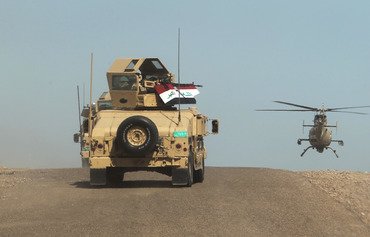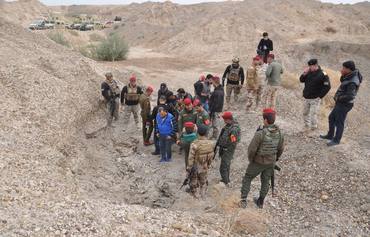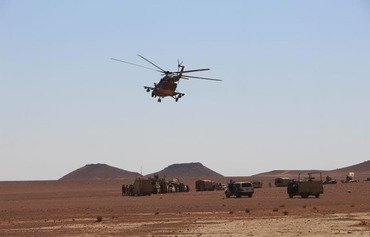In remote desert areas of Anbar, joint Iraqi forces are carrying out a manhunt for remaining pockets of "Islamic State of Iraq and Syria" (ISIS) fighters, Iraqi officials tell Diyaruna.
A new operation kicked off Monday (May 22nd) to comb al-Tabai, Bani Zayed and al-Kasrat areas in the eastern part of the province and clear out ISIS remnants who are posing a security threat, the Ministry of Defence said.
The targeted areas also include Thameel and Wadi al-Qadhaf, south of the international highway which connects Baghdad, Amman and Damascus.
"The operation aims at cracking down on scattered ISIS pockets and cells in those areas," the ministry said in a statement.
The campaign is one of a series of similar operations that al-Jazeera forces have conducted since the beginning of this year, al-Jazeera operations commander Maj. Gen. Qassem al-Mohammedi told Diyaruna.
The operations are being carried out with support from tribesmen, the Iraqi air force and international coalition fighter jets.
They aim to hunt down ISIS elements hiding in desert areas of Anbar and to "prevent them from using those areas for hiding and preparing attacks on nearby cities and military units", al-Mohammedi said.
They also aim to secure the international border to prevent ISIS infiltration.
Securing desert areas
"We have carried out quality combing operations in the Upper Euphrates desert areas, over a radius of more than 100 kilometres," al-Mohammedi said.
"In one of these operations, we advanced northwards to within 25 kilometres of the town of al-Qaim," he said, which is still under ISIS control.
Dozens of ISIS fighters are killed in each of these campaigns, he added, and their weapons and camps are destroyed in aerial and artillery bombardment.
Anbar, Iraq's largest province, borders Saudi Arabia, Jordan and Syria. It includes vast desert areas linked to Salaheddine and Ninawa provinces to the north and Babil, Karbala and Najaf to the south. Despite its size, it is sparsely populated, with most settlement near the Euphrates River.
Securing its vast desert areas requires heavy air cover, al-Mohammedi said.
"With our air power, we are able to cover a big part of the desert area, especially around al-Assad base (in the town of al-Baghdadi)," he said. "But there are large areas that do not get additional cover."
These include "the area that extends up to al-Rutba, which the enemy is trying to exploit in order to mobilise troops and carry out attacks on our units", he added.
Liberating the remaining Anbar cities -- Anah, Rawa and al-Qaim -- is a "necessary step" and will help to clear the desert areas, al-Mohammedi noted.
These cities, near the border with Syria, are where "militants gather before heading to desert areas", he said, adding that retaking them and asserting Iraq's control over its border "will cut off all of ISIS's outlets".
Following the success of the Iraqi forces in Ninawa and Anbar, most ISIS fighters have taken refuge in Anbar's desert, where it is easier for them to hide and evade airstrikes, said Anbar provincial council member Athal al-Fahdawi.
"As a result, they have managed to regroup and have recently been initiating attacks, especially on the international road that links [Iraq to] Syria and Jordan," he told Diyaruna.
Further efforts needed
Security forces have launched campaigns "to hunt down the terrorists deep into the desert and have beefed up their military deployment in order to repel the threats they pose", al-Fahdawi said.
Deep in the desert, security forces uncovered makeshift fuel stations that ISIS fighters had been using to fill up their tanks as they moved around the barren terrain, said Anbar operations commander Maj. Gen. Mahmoud al-Falahi.
Iraqi forces have completely destroyed these stations, he told Diyaruna.
Further efforts are needed, however, to secure the vast swathes of desert that make up the province, said al-Rutba mayor Imad al-Dulaimi.
Military operations alone are not enough "to completely get rid of terrorist cells in the vast Anbar desert", he told Diyaruna.
"Securing the Anbar desert is a thorny and complex undertaking," he said. "The country still has a lot more work to do, especially since the available capabilities are limited and not very effective."
Securing the desert will require constant helicopter monitoring with logistical support and ongoing patrols penetrating deep into the desert, he said.

![Iraqi military units launched a campaign in May to clear the desert areas of Anbar province of 'Islamic State of Iraq and Syria' pockets.[Photo courtesy of the Iraqi Ministry of Defence]](/cnmi_di/images/2017/05/24/7954-anbar-isis-isf-600_384.jpg)






